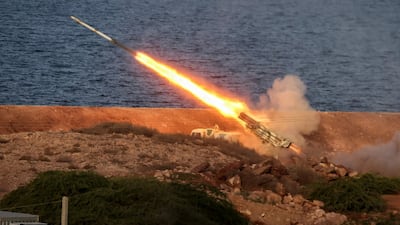Live updates: Follow the latest news on Israel-Gaza
Iran is making the greater geopolitical gains in the Israel-Gaza war but would significantly lose influence if the Middle East conflict were to be resolved, according to submissions to a UK parliamentary review of the country's foreign policy in the region.
If left unchecked, Tehran's nuclear programme could also lead to major proliferation across the region with others looking to deter any attack by building their own weapons, the statements to the influential Foreign Affairs Select Committee showed.
But Iran’s power base could be substantially undermined if an enduring solution were to be found for the region’s Palestinian population.
Leading academics and groups who submitted written evidence to the committee also stated that the Gulf region had learnt to become less dependent on the West and was instead creating a “new multipolar world order” with the help of other powers.
Hamas may be leading the attack against Israel but it was Iran that “is set to make the greater geopolitical gains from this attack if the UK and the West do not develop a comprehensive policy to counter its regional role,” said Lina Khatib, director of London University’s Middle East Institute.
She argued that Britain and the West’s “lack of engagement” on Iran meant that Arab countries had to seek their own routes to de-escalation.
“But this does not resolve the bigger picture of the persistence of Iran’s destructive interventions in the Middle East,” she added.
However, Iran’s influence would be “greatly diminished” if the Palestinian-Israeli conflict were finally resolved.
“Such a resolution means that Iran would lose a huge part of the legitimacy narrative it uses to justify its support for Hamas and Hezbollah,” she said.
Britain’s key regional allies, the UAE and Saudi Arabia, had been “persistently warning” about the destabilisation Iran was causing and the UK, now outside the EU, needed to develop “distinct and comprehensive” policies to tackle the issues.
Iran’s continued nuclear programme was a “direct challenge to the already precarious (im)balance of power in the region” that not only threatens Israel but Saudi Arabia and other Arab states, said Anoush Ehteshami, joint director of the ESRC Centre for the Advanced Study of the Arab World at Durham University
He warned that if Tehran’s nuclear programme was “left unchecked”, it could become “a precursor to proliferation across the region”.
In its submission, the Foreign Office conceded that Tehran's nuclear programme was advancing despite international efforts.

“Iran’s nuclear programme is also now more advanced than at any time and continues to develop, threatening regional and international security,” it said.
“On tackling direct threats, the UK is working alongside our international partners to contain Iran’s destabilising influence in the region and to prevent nuclear escalation.”
The experts pointed out that it was necessary that any country violating the Non-Proliferation Treaty on nuclear weapons would “face a series of punishments”, including economic and military sanctions.
The Gulf has learnt the lesson of being overdependent on the West and as result there was now a conviction it could establish a multipolar world order with “the help of other burgeoning powers”, argued Angie Hesham Abdo of Harvard University.
With Saudi Arabia and UAE joining the Brics (Brazil, Russia, India, China, South Africa) alliance as well expanding ties with India and countries in the Association of South-East Asian Nations, the Middle East was “contributing significantly to the post-western world in many ways”, she added.
The European Council on Foreign Relations said London has new opportunities to engage in regional diplomacy.
“The emergence of a multipolar regional order highlights the need for the UK to increase its regional influence to secure its interests,” it said.
“The new regional landscape, where no single power is dominant, provides the need and space for the UK to more effectively work with partners.”
In the report titled the UK’s national interest in the Middle East and North Africa, Prof Ehteshami also argued that Britain needed to retain its “extensive military ties” with Gulf Arab states.
Britain could also assist in encouraging dialogue with Iran around shared interests such as “climate change, the shared bounties of the Gulf, efforts to contain water pollution and de-escalation of disputes”, the academic added.




